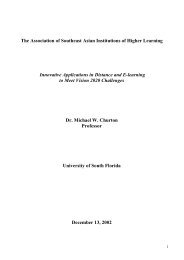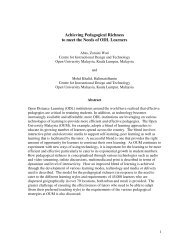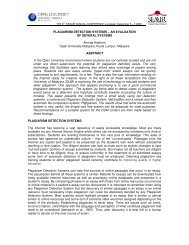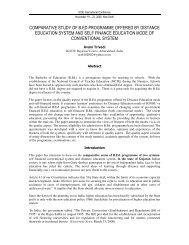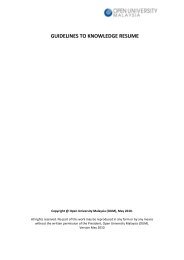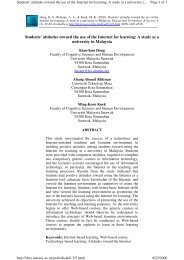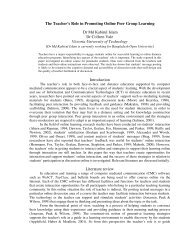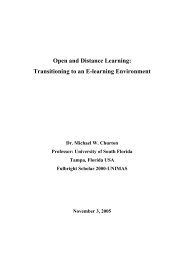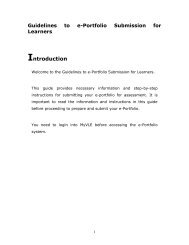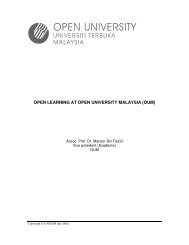Moderators of online discussion forums then need to ensure that students are meetingthe necessary academic st<strong>and</strong>ards in their online discussion, such as evidence-basedargument, setting argument within a conceptual framework <strong>and</strong> relating discussion tothe concepts <strong>and</strong> ideas covered in the course materials. If not, the discussion can easilydeteriorate into a swapping of unsubstantiated opinions among students. Paloff <strong>and</strong>Pratt (2001) <strong>and</strong> Salmon (2000) provide guidelines for moderators to enable knowledgeconstruction, although these studies are based more on direct experience than scientificresearch.Critical thinkingThe development of critical thinking skills is another argument put forward for Webbased<strong>learning</strong>. There are several reasons why educators favour asynchronous computerconferencing for more reflective, critical thinking. The opportunity for students tochallenge course materials, to challenge other students’ conceptions <strong>and</strong> arguments withina course <strong>and</strong> to find <strong>and</strong> compare multiple <strong>and</strong> perhaps conflicting sources of informationshould all help promote critical thinking.Because computer conferences can be archived <strong>and</strong> analysed later, it is easier toevaluate these discussions than those that occur in the classroom. Despite this, onceagain it is difficult to find in the literature studies that relate specific design featuresof online teaching to the development of empirically validated critical thinkingskills, although MacKnight (2001) <strong>and</strong> Scardamalia <strong>and</strong> Bereiter (1999) providesome guidelines on facilitating critical thinking skills <strong>and</strong> knowledge constructiononline within school settings. Thus Web-based <strong>learning</strong> provides the potential for thedevelopment of critical thinking skills, but there is still a need for active interventionby moderators <strong>and</strong> designers to ensure that critical thinking skills are actuallydeveloped.Collaborative <strong>learning</strong>One great advantage of online <strong>learning</strong> is the opportunity for students separated by time<strong>and</strong> place to work together on a common task. Learning to work together online is anincreasingly important workplace skill, but it also provides opportunities for studentsto share experiences, to learn how to work collaboratively <strong>and</strong> to test <strong>and</strong> develop theirown ideas, without being physically present. It is particularly valuable for courseswhere students are from different countries or cultures <strong>and</strong> for continuing professionaldevelopment, where participants have relevant professional experiences to share <strong>and</strong>draw from.There is, though, evidence that using the Web for collaborative <strong>learning</strong> is notwithout its own problems. The teacher must pay particular attention to ensure thatstudents are clear as to their tasks, that they have adequate resources for the tasks <strong>and</strong>that there are clear guidelines for working collaboratively. There must be proceduresin place to deal with conflict resolution within groups <strong>and</strong> for dealing with studentswho do not participate fully, or at all, in group assignments. Assessment of individualstudents can be particularly challenging when they are working in groups. In thisrespect, once again, the general literature on collaborative <strong>learning</strong> applies just asstrongly to online as to face-to-face teaching. Distance Education, Vol. 23, No. 1is devoted to research on collaborative <strong>and</strong> problem-based <strong>learning</strong> in <strong>distance</strong><strong>education</strong>.140
Cultural <strong>and</strong> ethical issues in international <strong>distance</strong> <strong>education</strong>The development of online courses aimed at international audiences has led to concernsabout cultural imperialism <strong>and</strong> the possible dominance of American programming (e.g.Boshier, et al., 1998). Mason (1998) came to the following conclusions following fivecase studies of international <strong>distance</strong> <strong>education</strong> programmes:• a preponderance of English as the language for international <strong>distance</strong> programmes;• cultural issues were not being explicitly addressed in these programmes;• there was considerable diversity in the approaches to international <strong>distance</strong><strong>education</strong>;• going international forced a very careful consideration of the <strong>education</strong>al process inall the case-studies;• there was a focus on business, IT <strong>and</strong> <strong>education</strong>al technology topics, reflecting thedem<strong>and</strong>s of the <strong>lifelong</strong> <strong>learning</strong> market.Bates (2000; 2005) has criticised the ethics of some of the for-profit <strong>distance</strong> <strong>education</strong>programmes being developed by more economically advanced countries. Bates (2000)has also described some of the cultural issues in teaching at a <strong>distance</strong> that arise fromdiffering approaches to teaching <strong>and</strong> <strong>learning</strong> in different countries, especially thediffering relationships between teachers <strong>and</strong> students. He also noted the need for localcultural adaptation of courses <strong>and</strong> recommended joint <strong>and</strong> equal partnerships betweeninstitutions in different countries to ensure cultural relevance.Possibly for these reasons, the fear of American domination of the international <strong>distance</strong><strong>education</strong> market is so far unfounded. In major studies of international <strong>education</strong>providers for the Australian government, Cunningham et al. (2000) <strong>and</strong> Ryan <strong>and</strong>Stedman (2002) found little evidence that there would be “a tidal wave of new providersemerging … in the short term”. However, they did warn that“the implications of commercialisation are profound. The new providers arenot bound by norms or ideals of traditional <strong>higher</strong> <strong>education</strong> such as collegialgovernance, linked research <strong>and</strong> teaching, or academic autonomy <strong>and</strong> control”(Cunningham et al, 2000, p. 153).Similarly, Murphy, Zhang <strong>and</strong> Perris (2003), reporting on online <strong>learning</strong> in <strong>Asia</strong>,commented: “Arguably, any simple ‘imperialist’ strategy has failed, for a variety ofreasons”, pointing out that “many <strong>Asia</strong>n countries are already supporting others in theregion <strong>and</strong> offering cross-border studies at a quality <strong>and</strong> cost that cannot be met bytheir Western counterparts.” Thus, while caution is needed, experience is growing ondeveloping successful international <strong>distance</strong> <strong>education</strong> programmes that respect <strong>and</strong>re-inforce different cultures. The whole of Volume 22, No. 1 of Distance Education isdevoted to articles on cultural issues in international <strong>distance</strong> <strong>education</strong>.There is clear evidence that when well designed, <strong>distance</strong> <strong>education</strong> can be as effective asface-to-face teaching, across a wide variety of subjects <strong>and</strong> target groups. As a result ofconstructivist theory, some very strong claims have been made for the benefits of online<strong>learning</strong>. However, to date, there is very little research to either deny or support thoseclaims. Perhaps more importantly though, the development of online <strong>learning</strong> is seenas meeting the needs particularly of knowledge-based economies. In contrast, secondgeneration <strong>distance</strong> <strong>education</strong>, based on the mass media of print <strong>and</strong> broadcasting, maygive greater economies of scale while still meeting the needs of industrial or agriculturaleconomies <strong>and</strong> thus may be more appropriate for less economically advanced countries.141
- Page 1 and 2:
PERSPECTIVES ONDISTANCE EDUCATIONLi
- Page 3 and 4:
The Commonwealth of Learning (COL)
- Page 5 and 6:
ACKNOWLEDGEMENTSIn addition to the
- Page 7 and 8:
These are some of the issues that a
- Page 9 and 10:
What are the trends and issues in l
- Page 11 and 12:
of policy implications relating to
- Page 13 and 14:
evince important differences that c
- Page 15 and 16:
inequitable regulations governing t
- Page 17 and 18:
associations and groups of countrie
- Page 19 and 20:
THE CONTRIBUTORChristopher McIntosh
- Page 21 and 22:
INTRODUCTIONIn his 1996 report to U
- Page 23 and 24:
Lastly, our analysis of the situati
- Page 25 and 26:
diploma or similar certificates of
- Page 27 and 28:
force of the undertaking. Here agai
- Page 29 and 30:
RELEVANT INTERNET SITESUNESCO Task
- Page 31 and 32:
Notes1. This phrasing has been used
- Page 33 and 34:
goals (Daniel, 1996). Lifelong lear
- Page 35 and 36:
eported that group activity had red
- Page 37 and 38:
NEW AREAS FOR DISTANCE EDUCATION:WO
- Page 39 and 40:
targets systematically for the use
- Page 41 and 42:
Rausch, A.S. (2003). A case study o
- Page 43 and 44:
correspondence teaching systems tha
- Page 45 and 46:
significant differences between syn
- Page 47 and 48:
In distance flexible- and blended-e
- Page 49 and 50:
STATE-FUNDED DUAL-MODE SYSTEMS ATUN
- Page 51 and 52:
Table 4.2: Fundable elements in dis
- Page 53 and 54:
sciences in 21 countries of the reg
- Page 55 and 56:
How a system is funded depends in p
- Page 57 and 58:
Litto, Fredric M. (2004). Digital l
- Page 59 and 60:
CHAPTER 5LIFELONG LEARNING IN THE A
- Page 61 and 62:
education, which was initiated by C
- Page 63 and 64:
So the virtual classroom acted as a
- Page 65 and 66:
In June 2002, when the course came
- Page 67 and 68:
RELEVANT INTERNET SITESFORCIIR proj
- Page 69 and 70:
11. The approximate rate for 1€ w
- Page 71 and 72:
The term modern distance education
- Page 73 and 74:
the National Networked Consortium f
- Page 75 and 76:
important resource for undeveloped
- Page 77 and 78:
standards have been proposed for th
- Page 79 and 80:
The development of e-learning withi
- Page 81 and 82:
RELEVANT INTERNET SITESCCRTVU Onlin
- Page 83 and 84:
MoE (2004b) The Notice on Running N
- Page 85 and 86:
CHAPTER 7QUALITY ASSURANCE SURVEYOF
- Page 87 and 88:
(Paris, France, 28-29 June 2004) in
- Page 89 and 90:
Examples of elaborated QA policies:
- Page 91 and 92:
plans and produces its conventional
- Page 93 and 94: SHTVU (China)• Teaching• Teachi
- Page 95 and 96: offers its programmes to Turkish ci
- Page 97 and 98: mega universities apply a set of st
- Page 99 and 100: RELEVANT INTERNET SITESThe Commonwe
- Page 101 and 102: 2. QA initiatives or publications b
- Page 103 and 104: assurance of ODL. This DST will be
- Page 105 and 106: Educational Planning has been respo
- Page 107 and 108: A system of weighting of the key qu
- Page 109 and 110: RELEVANT INTERNET SITESHigher Educa
- Page 111 and 112: CHAPTER 9THE FINNISH VIRTUAL UNIVER
- Page 113 and 114: foreign providers. In Finland, the
- Page 115 and 116: to make the best use of new educati
- Page 117 and 118: The foremost task for the Service U
- Page 119 and 120: part of quality management. The aim
- Page 121 and 122: online courses; an educational tech
- Page 123 and 124: polytechnics, research institutions
- Page 125 and 126: CHAPTER 10PROMOTING CROSS-BORDERREC
- Page 127 and 128: The Bologna Declaration was followe
- Page 129 and 130: indicators currently being used for
- Page 131 and 132: the qualification resulting from th
- Page 133 and 134: Table 9.1: Outline of the portfolio
- Page 135 and 136: • Make sure that incoming student
- Page 137 and 138: CHAPTER 11CHARTING THE EVOLUTIONOF
- Page 139 and 140: Another common characteristic was t
- Page 141 and 142: the current capacity of the educati
- Page 143: conditions for success. Conditions
- Page 147 and 148: the cost and maintenance of learnin
- Page 149 and 150: Research can be a useful tool for c
- Page 151 and 152: REFERENCESBates, A. (1995). Technol
- Page 153 and 154: Twigg, C. (2001). Quality Assurance
- Page 155 and 156: y, for example, entering into partn
- Page 157 and 158: and even greater steps, and the dec



